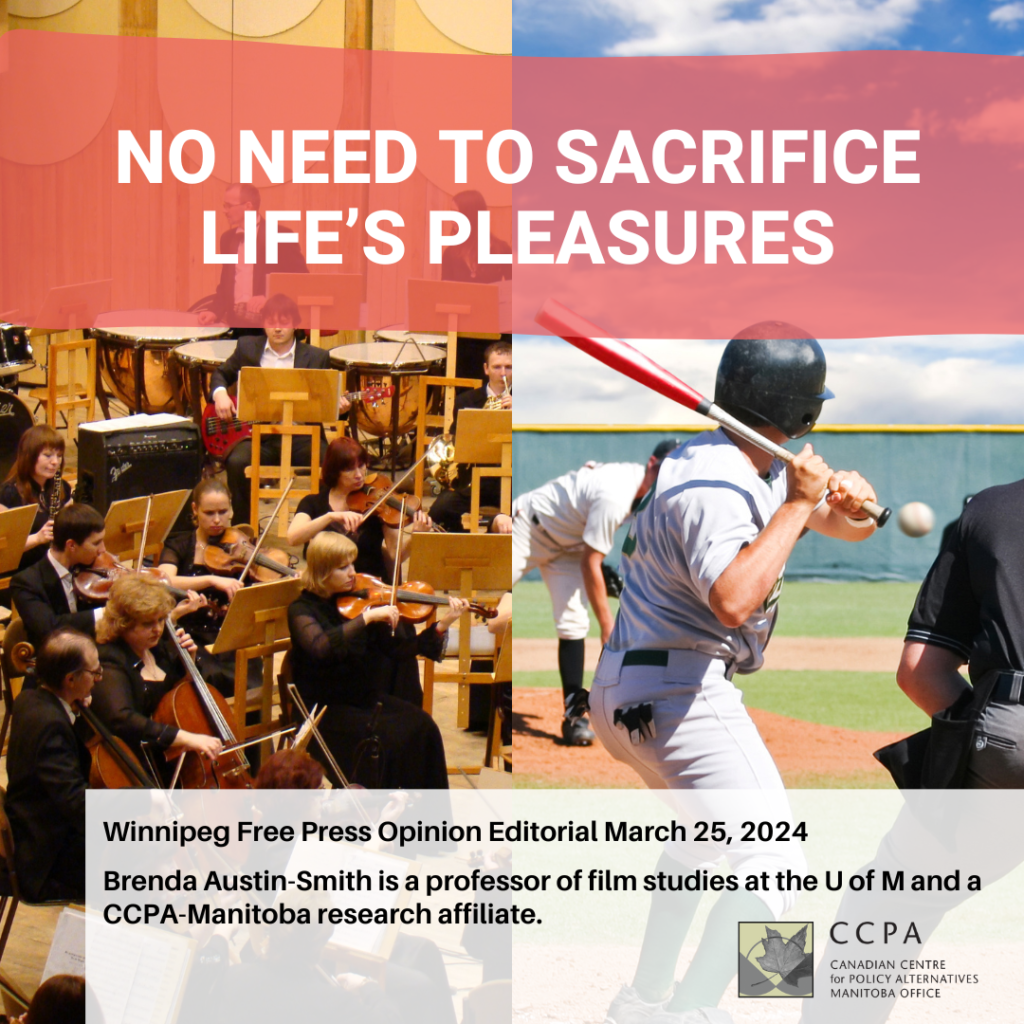Previously published in the Winnipeg Free Press March 25, 2024
MANITOBANS play, sing, act, and dance as well as other Canadians do, and it’s time for our provincial government to fund the places and spaces through which we express ourselves through culture, play, and art.
We are proud of the richness and variety of our festivals, arts events, and sports opportunities. Whether professional or amateur, held in an arena, concert hall, or a school soccer pitch, the sheer range of things to do and see can fill a family calendar for months — and often does.
So in the upcoming provincial budget, where on the list of worthy causes will recreation, culture, and arts appear? Near the top? Or near the bottom, where previous government cuts to people, programs, and communities have put it? Budgets reflect priorities, and we’re about to learn on April 2 if culture, art, and sports are priorities of the new provincial government.
Many community-focused organizations in Manitoba receive provincial funding, as do artist groups and amateur sports organizations. That’s why the Conservative government’s 2017 announcement that it would review sports and cultural funding should have been a hopeful sign. Unfortunately, that review prompted years of austerity: a road map for cuts, job losses, and an aggressive focus on commercial priorities rather than community recreational needs or artistic value.
Implementing that vision has had a devastating effect on ministry employees and organizations that rely on provincial funding to operate. And of course, the people of Manitoba ultimately receive less than what they deserve as sports programs, community recreational supports, cultural events, and funding for arts activities are slashed.
Spending on arts, culture and sports fell 13 per cent from 2016-2022. The comparison is stark: total
expenditures on sports, recreation, arts, culture, and heritage fell from $82 per Manitoban in 2015-16 to $66 in 2021-22. The downstream effects of these cuts show up in increased privatization, more contracting out of jobs that government workers already do, and reductions in staffing that affect sports and cultural programs and services provided to Manitobans. The over $3.5 million cut to the sector in 2017 has resulted in a position vacancy rate of 26 per cent, with only 95 staff struggling to do the work assigned to 126 full-time positions.
I am a researcher on a project that examined provincial government austerity from 2016-20, based on a review of provincial staffing and expenditure data as well as surveys completed by over 2,000 public service workers, including the workers in sports, recreation, and arts mentioned above.
Surveying the effects on their units of years of austerity, those working in the ministry of sport, culture, and heritage under the previous government voiced concern for the sector as a whole. “This government has completely disregarded any evidence of the resulting damage to public services and showed no empathy for its employees and the majority of Manitobans” said one. Fears that further cuts “could kill off arts organizations,” especially in rural areas, and that staff can’t fulfil their current mandates for service ran throughout these comments. “This erosion of public service capacity has been demoralizing and damaging,” said one. “The only thing keeping the lights on … is the unwavering devotion to our profession and belief that what we do is important to Manitobans.”
If the new government really wants to turn the page on this file and undo the damage, the fate of the arts, culture and sport in community (ACSC) fund is the bellwether to watch for. One of the most critical funding programs still in limbo
after last fall’s election, the ACSC supports up to 50 per cent of eligible project costs to a truly astonishing range of groups and activities in every region of this province — places like Morden, Swan River, Dauphin, Gimli, Thompson and Winnipeg.
The $50-million ACSC fund is at risk because, even though it was announced by the previous government in July 2023, it wasn’t included in their budget. The incoming NDP acknowledged this absence as a problem, but nevertheless adopted the Conservative government’s budget. Glen Simard, the new minister, has promised an update on the future of ACSC but nothing has been announced so far. The disappearance of this fund would have devastating consequences across the province, adding to the ruination of the sector.
Recreation, culture, and the arts are what some call the roses of life — the pleasures that sustain the soul, just as bread feeds the body. We shouldn’t have to choose between bread and roses. We deserve them both.
Brenda Austin-Smith is a professor of film studies at the University of Manitoba and a CCPA-Manitoba research affiliate.



